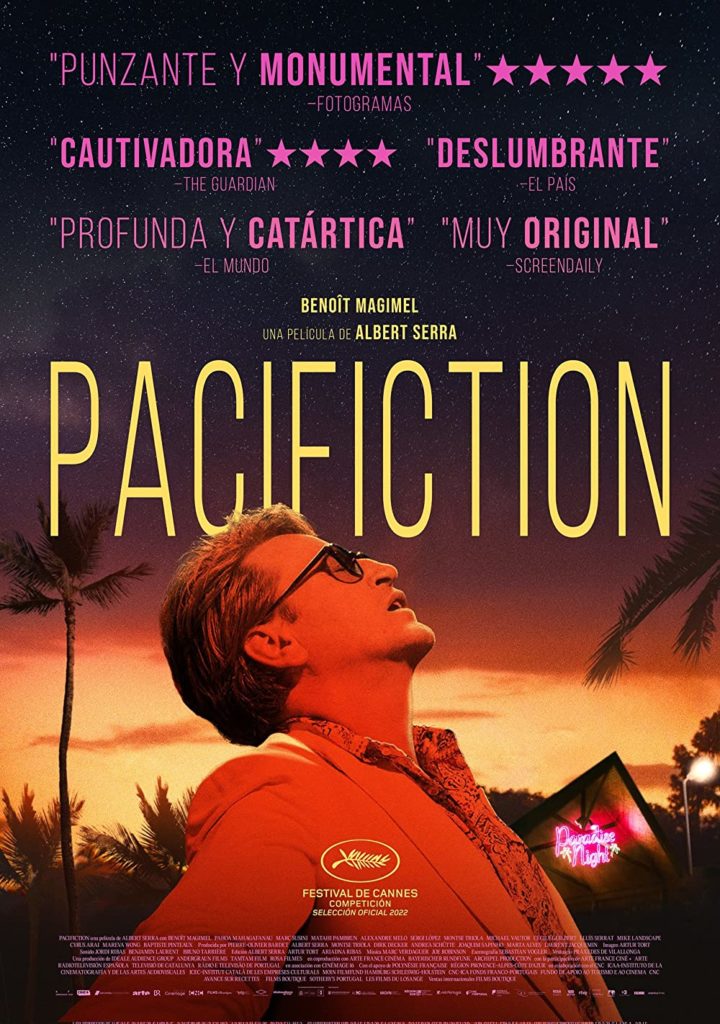In Praise of Pacifiction, Alberto Serra’s Languorous Film
The Torino Film Festival
One of the many highlights of the year here in Torino, aside from watching the shop windows turn out in their holiday finery, is the annual Torino Film Festival, which typically runs for eight or nine days at the end of November. This year the Festival celebrated its 40th anniversary, with Malcolm McDowell in town to receive an award from the Festival on the occasion of the 50th anniversary of A Clockwork Orange. I was only able to make it to two films this year: Charlotte Le Bon’s Falcon Lake, and Albert Serra’s Pacifiction.
Falcon Lake – Pochi ma buoni (“Few but Good”)
I had tried to get in to see the Polish/Italian collaboration of director Jerzy Skolimowski’s EO but this year’s Jury Prize winner at Cannes (shared with the Italian film based on Paolo Cognetti’s book, Le Otto Montagne/Eight Mountains) seemed like it must have sold out immediately after the tickets went on sale. (Side note on EO: Poland has entered it as its international film selection for the 2023 Academy Awards.) The first weekend of the festival I very much enjoyed Falcon Lake, the directorial debut of Charlotte Le Bon (based on the graphic novel Une sœur by Bastien Vivès), and the second screening I was able to take in was Catalan director Albert Serra’s Pacifiction.
Pacifiction
While Falcon Lake has been categorized in various sources as coming-of-age with some hints of the supernatural because of a ghost at the lake, Pacifiction has been listed as both drama and thriller. I personally feel that calling it a thriller is a bad choice since audiences generally have a certain idea in mind when they hear that word. And those people were probably the ones who didn’t seem to enjoy the screening of the film. Set on the island of Tahiti, De Roller (Benoît Mugimel), the French High Commissioner, is visiting the locals in his role as government official. The mystery aspect of the film involves rumors that a submarine has been spotted off the coast, something that has been more or less borne out by the fact that young women are being shuttled out by boat every evening away from the coast, returning in “horrible shape” in the morning, ostensibly after attending to French sailors. The locals fear the French have decided to recommence nuclear testing among the atolls and they begin to pressure De Roller to find out what’s happening, and for his support.
Check Your Stress at the Door
The film unrolls at a very leisurely pace — check your stress at the door — where we are immersed in the lives of both the locals and De Roller. De Roller spends his days clad in a cream-colored suit (no Panama hat, though), meeting with locals. By night he chills out with the same members of the community at the Paradise Night. The suit remains. An incident with a Portuguese diplomat who claims his passport has been stolen leaves us wondering about De Roller’s intentions while at the same time introducing us to Shannah, portrayed by the absolutely mesmirizing Pahoa Mahagafanau. Mahagafanau’s presence on the screen made me perk up every time she appeared and she’s the person I continue to think about when I think about Pacifiction. A trans actor who thought she was going to be cast as an extra in the film, she ended up being one of the main characters (Hine Magazine). I can’t wait to see her in something else.
Whittled Down?
Could the film’s two hours and forty minutes have been whittled down to an hour and a half? Well…while I think a few individual scenes could have been pared down slightly, overall I feel like this would have done a disservice to the film. Serra allows us to wade in and really float around in the quotidian lives of the island residents and those who come to visit in one capacity or another. One exception to the overall pace of the film is a high-thrills scene which treats viewers to massive waves as surfers brave the walls of water. Serra takes us out on the water, too, as we get swept along for the ride in one of the boats watching from the edges of the rollers. Scary as hell but so much fun. Surrealistic scenes abound, including one at the end of the film featuring the French admiral (Marc Susini). Having earlier reassured De Roller that the local population has nothing to worry about, he calmly stands, makes his way to the dance floor, and begins dancing to Freddy Butler’s 1967 I Like Your Style. Arms raised, he dances slowly, alone. One by one he encourages a few of the scantily-clad wait staff, both men and women, to join in, followed by a handful of sailors he’s brought ashore. The scene that follows shows him returning to his brisk self, and the conclusion of the film.
Shifting Flexibility
Muted voices at the Paradise Night; UV lighting emphasizing the colors of the drinks; the calm, measured way everyone talked to each other even while they were at the night club; the shifting flexibility of the formal versus informal French “you” (whose usage alternated depending on the situation, even between pairs of people who had either been informal or formal with each other at other points during the film); De Roller and his suit — these were all things I really enjoyed about this film. Did I understand everything (what did the odd American guy and the Portuguese diplomat have to do with things?)? No. Did it ruin my enjoyment of this film? No way.
For more films I’ve enjoyed, check out my recent posts.
Pulling at Threads is my occasional newsletter. It always accompanies my blog posts but I sometimes send infrequent updates on other goings on. If you want more of an “insider’s” view on what’s happening in my reading and writing life, you can sign up here.


